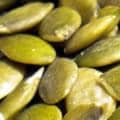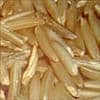Magnesium is an essential mineral required by the body for maintaining normal muscle and nerve function, keeping a healthy immune system, maintaining heart rhythm, and building strong bones. Magnesium is also involved in at least 300 biochemical reactions in the body. A deficiency in magnesium can lead to muscle spasms, cardiovascular disease, diabetes, high blood pressure, anxiety disorders, migraines, osteoporosis, and cerebral infarction. Conversely, consuming too much magnesium typically causes diarrhea as the body attempts to excrete the excess. The current DV for magnesium is 400mg. Below is a list of high magnesium foods, for more, see the lists of high magnesium foods by nutrient density, magnesium rich foods, vegetables high in magnesium, and fruits high in magnesium.

| Magnesium in 100g | 1 Cup Raw (30g) | 1 Cup Cooked (180g) |
| 79mg (20% DV) | 24mg (6% DV) | 157mg (39% DV) |

| Magnesium in 100g | 1/2 Cup (113g) | 1 Ounce (28g) |
| 534mg (134% DV) | 606mg (152% DV) | 150mg (37% DV) |

| Magnesium in 100g | Per 3oz Fillet (85g) |
| 97mg (24% DV) | 82mg (21% DV) |

| Magnesium in 100g | 1 Cup Cooked (172g) |
| 86mg (22% DV) | 148mg (37% DV) |

| Magnesium in 100g | 1 Cup Cooked (195g) |
| 44mg (11% DV) | 86mg (21% DV) |

| Magnesium in 100g | 1 Avocado (201g) | 1/2 Cup Pureed (115g) |
| 29mg (7% DV) | 58mg (15% DV) | 33mg (9% DV) |

| Magnesium in 100g | 1 Cup (245g) |
| 19mg (5% DV) | 47mg (12% DV) |

| Magnesium in 100g | 1 Medium (63g) | 1 Cup Slices (150g) |
| 27mg (7% DV) | 32mg (8% DV) | 41mg (10% DV) |

| Magnesium in 100g | 1/2 Cup (75g) | 1 Fig (8g) |
| 68mg (17% DV) | 51mg (13% DV) | 5mg (1% DV) |

| Magnesium in 100g | 1 Square (29g) | 1 Cup Grated (132g) |
| 327mg (82% DV) | 95mg (24% DV) | 432mg (108% DV) |
The Top 10 High Magnesium Foods by Nutrient Density (Magnesium per Gram)
| #1: Rice Bran | 781mg (195% DV) per 100 grams | 922mg (230% DV) per cup (118 grams) | Click to see complete nutrition facts for Rice Bran |
| #2: Dried Herbs and Spices (Coriander, Dill, Sage Basil) | 694mg (174% DV) per 100 grams | 14mg (3% DV) per tablespoon (2 grams) | Click to see complete nutrition facts for Dried Herbs |
| #3: Pumpkin & Squash Seeds | 535mg (134% DV) per 100 grams | 738mg (185% DV) per cup (138 grams) | Click to see complete nutrition facts for Pumpkin & Squash Seeds |
| #4: Cocoa Powder | 499mg (125% DV) per 100 grams | 25mg (6% DV) per tablespoon (5 grams) | Click to see complete nutrition facts for Cocoa Powder |
| #5: Flaxseeds | 392mg (98% DV) per 100 grams | 39mg (10% DV) per tbsp (10 grams) | Click to see complete nutrition facts for Flaxseeds |
| #6: Brazil Nuts | 376mg (94% DV) per 100 grams | 500mg (125% DV) per cup (133 grams) | Click to see complete nutrition facts for Brazil Nuts |
| #7: Tahini (Sesame Seed Paste) | 353mg (88% DV) per 100 grams | 49mg (12% DV) per tablespoon (14 grams) | Click to see complete nutrition facts for Tahini |
| #8: Sunflower Seeds | 346mg (87% DV) per 100 grams | 14mg (3% DV) per tablespoon (4 grams) | Click to see complete nutrition facts for Sunflower Seeds |
| #9: Wheat Germ | 313mg (78% DV) per 100 grams | 360mg (90% DV) per cup (115 grams) | Click to see complete nutrition facts for Wheat Germ |
| #10: Molasses | 242mg (61% DV) per 100 grams | 48mg (12% DV) per tablespoon (20 grams) | Click to see complete nutrition facts for Molasses |
Other Magnesium Rich Foods
| Peanut Butter | 154mg (39% DV) per 100 gram serving | 397mg (99% DV) per cup (258 grams) | 49mg (12% DV) in two tablespoons (32 grams) | Click to see complete nutrition facts for Smooth Peanut Butter |
| Espresso | 80mg (20% DV) per 100 gram serving | 96mg (24% DV) in half a cup (4fl/oz ~120 grams) | 24mg (6% DV) in a fluid ounce (fl/oz) (56 grams) | Click to see complete nutrition facts for Espresso |
| Coffee (Caffeinated or Decaf) | 3mg (1% DV) per 100 gram serving | 7mg (2% DV) in one cup (8fl/oz, 237 grams) | 1mg (0% DV) in a fluid ounce (fl/oz) (30 grams) | Click to see complete nutrition facts for Coffee |
| Whole Wheat Bread | 82mg (21% DV) per 100 gram serving | 23mg (6% DV) per slice (28 grams) | 46mg (12% DV) in two slices (56 grams) | Click to see complete nutrition facts for Whole Wheat Bread |
| Whole Milk | 10mg (3% DV) per 100 gram serving | 98mg (24% DV) per quart (976 grams) | 24mg (6% DV) per cup (244 grams) | Click to see complete nutrition facts for Whole Milk |
| Seaweed (Spirulina) | 195mg (49% DV) per 100 gram serving | 218mg (55% DV) per cup (112 grams) | 14mg (3% DV) per tablespoon (7 grams) | Click to see complete nutrition facts for Seaweed (Spirulina) |
| Vegetarian Baked Beans | 27mg (7% DV) per 100 gram serving | 69mg (17% DV) per cup (254 grams) | 34mg (9% DV) in half a cup (127 grams) | Click to see complete nutrition facts for Vegetarian Baked Beans |
| Corn Meal (White or Yellow) | 127mg (32% DV) per 100 gram serving | 211mg (53% DV) per cup (166 grams) | 106mg (26% DV) per half cup (83 grams) | Click to see complete nutrition facts for Corn |
Vegetables High in Magnesium
| Scotch (Curly) Kale | 88mg (22% DV) per 100 gram serving | 59mg (15% DV) per cup chopped (67 grams) | 29mg (7.5% DV) per (1/2) cup chopped (33.5 grams) | Click to see complete nutrition facts for Scotch Kale |
| Beet Greens | 70mg (18% DV) per 100 gram serving | 27mg (7% DV) per cup (38 grams) | 22mg (6% DV) per leaf (32 grams) | Click to see complete nutrition facts for Beet Greens |
| Globe Artichoke | 60mg (15% DV) per 100 gram serving | 77mg (19% DV) per medium artichoke (128 grams) | 97mg (24% DV) per large artichoke (162 grams) | Click to see complete nutrition facts for Artichokes |
| Okra | 57mg (14% DV) per 100 gram serving | 28mg (7% DV) per (1/2) cup (50 grams) | 54mg (14% DV) per 8 pods (95 grams) | Click to see complete nutrition facts for Okra |
| Arugula (Rocket) | 47mg (12% DV) per 100 gram serving | 9mg (2% DV) per cup (20 grams) | 1mg (0% DV) per leaf (2 grams) | Click to see complete nutrition facts for Arugula |
| Sweet Corn | 37mg (9% DV) per 100 gram serving | 57mg (14% DV) per cup (154 grams) | 33mg (8% DV) per medium ear (90 grams) | Click to see complete nutrition facts for Sweet Corn |
| Butternut Squash | 34mg (9% DV) per 100 gram serving | 48mg (12% DV) per cup cubed (140 grams) | 24mg (6% DV) per (1/2) cup cubed (70 grams) | Click to see complete nutrition facts for Butternut Squash |
| Savoy Cabbage | 28mg (7% DV) per 100 gram serving | 20mg (5% DV) per cup shredded (70 grams) | 10mg (2.5% DV) per (1/2) cup shredded (35 grams) | Click to see complete nutrition facts for Savoy Cabbage |
| Peas | 24mg (6% DV) per 100 gram serving | 15mg (4% DV) per cup whole peas (63 grams) | 8mg (2% DV) per 10 pea pods (34 grams) | Click to see complete nutrition facts for Peas |
| Cucumber (With Peel) | 13mg (3% DV) per 100 gram serving | 14mg (4% DV) per cup sliced (104 grams) | 39mg (10% DV) per cucumber (301 grams) | Click to see complete nutrition facts for Cucumber |
| Baked Potato (With Skin) | 30mg (8% DV) per 100 gram serving | 90mg (22% DV) in a large potato (299 grams) | 52mg (13% DV) per medium sized potato (173 grams) | Click to see complete nutrition facts for Russet Potatoes |
Fruits High in Magnesium
| Blackberries | 20mg (5% DV) per 100 gram serving | 29mg (7% DV) per cup (144 grams) | 24mg (3.5% DV) per (1/2) cup (72 grams) | Click to see complete nutrition facts for Blackberries |
| Raspberries | 22mg (6% DV) per 100 gram serving | 27mg (7% DV) per cup (123 grams) | 4mg (1% DV) per 10 raspberries (19 grams) | Click to see complete nutrition facts for Raspberries |
| Strawberries | 13mg (3% DV) per 100 gram serving | 19mg (5% DV) per cup whole (144 grams) | 9mg (2% DV) per 6 medium strawberries (72 grams) | Click to see complete nutrition facts for Strawberries |
| Jackfruit | 37mg (9% DV) per 100 gram serving | 61mg (15% DV) per cup sliced (165 grams) | 30mg (7.5% DV) per (1/2) cup sliced (82.5 grams) | Click to see complete nutrition facts for Jackfruit |
| Watermelon | 10mg (3% DV) per 100 gram serving | 15mg (4% DV) per cup diced (152 grams) | 29mg (7% DV) per wedge (approx 1/16 melon, 286 grams) | Click to see complete nutrition facts for Watermelon |
| Guava | 22mg (6% DV) per 100 gram serving | 36mg (9% DV) per cup (165 grams) | 12mg (3% DV) per fruit without waste (55 grams) | Click to see complete nutrition facts for Guava |
| Plantain | 37mg (9% DV) per 100 gram serving | 55mg (14% DV) per cup sliced (148 grams) | 66mg (17% DV) per medium fruit (179 grams) | Click to see complete nutrition facts for Plantain |
| Kiwi Fruit | 17mg (4% DV) per 100 gram serving | 30mg (8% DV) per cup (177 grams) | 13mg (3% DV) per medium fruit without skin (76 grams) | Click to see complete nutrition facts for Kiwi Fruit |
| Passion Fruit | 29mg (7% DV) per 100 gram serving | 68mg (17% DV) per cup (236 grams) | 5mg (1% DV) per fruit without waste (18 grams) | Click to see complete nutrition facts for Passion Fruit |
| Grapefruit (Pink/Red/White) | 8mg (2% DV) per 100 gram serving | 18mg (5% DV) per cup sections with juice (230 grams) | 10mg (3% DV) per (1/2) medium fruit (128 grams) | Click to see complete nutrition facts for Grapefruit |
Health Benefits of Magnesium
- Regulation of Blood Pressure - Diets high in fruits and vegetables provide both magnesium and potassium which are consistently associated with reduced blood pressure.3-5
- Reduced Risk of Type II Diabetes - Magnesium is involved in carbohydrate metabolism and the bodies use of insulin.6 Studies show that individuals with type II diabetes have low levels of magnesium in their blood.7 Correcting this lack of magnesium may help increase sensitivity to insulin and prevent type II diabetes.8
- Reduced Risk of Heart Attack and other Cardiovascular Diseases - Because magnesium is associated with regulation of blood pressure and lower risk of diabetes, it follows that it also reduces risk of cardiovascular disease.9 Elevated levels of magnesium in the blood has been associated with reduced risk of heart attack and stroke.10-12
- Reduced Risk of Osteoporosis - Magnesium plays a role in calcium metabolism and hormones which regulate calcium and may help to protect against osteoporosis.7,13 Several studies support that increased magnesium intake increases bone health.7,14
- Reduced Frequency of Migraine Headaches (*Controversial) - Studies show that individuals who have frequent migraine headaches have lower levels of magnesium than other individuals.15 There is conflicting evidence as to whether increased intake of magnesium will reduce the frequency of migraines.15-18
- Alleviation of Premenstrual Syndrome (PMS) - Studies suggest that consuming higher amounts of magnesium, perhaps in conjunction with vitamin B6, helps to alleviate bloating, insomnia, leg swelling, weight gain, breast tenderness, and other symptoms associated with PMS.19
Factors which Affect Magnesium Absorption
- Fermentable carbohydrates like those found in grains, dairy, and fruit enhance the absorption of mangesium.37
- Foods with protein enhance the absorption of magnesium and calcium.38
- Eating foods high in insoluble fiber, or taking supplemental dietary fiber, is likely to hinder magnesium absorption.37
- Phytates, found in vegetables, grains, seeds, and nuts may slightly hinder magnesium absorption, however, the soluble fiber, and fermentable carbohydrates found in these foods likely counteracts this effect, making most plant foods a great source of magnesium.37
- Foods high in oxalates, such as spinach, leafy greens, nuts, tea, coffee and cacao also reduce magnesium absorption. Cooking reduces oxalic acid, so cooking spinach and other greens is better than eating them raw (in terms of magnesium absorption).35
- Long distance athletes - People who exercise over long distances lose electrolytes via sweat and need to replenish their sodium, potassium, magnesium, and phosphorus levels.
- Dehydration - People who consume excess alcohol, or suffer diarrhea, or can be otherwise dehydrated need to replenish their sodium, potassium, magnesium, and phosphorus levels.
- People with Gastrointestinal Disorders - Most magnesium is absorbed through the colon so people with gastrointestinal disorders like Crohn's disease are at high risk for a magnesium deficiency.19,20
- People with Poor Functioning Kidneys - The kidneys should be able to regulate magnesium in the blood, excreting less when stores are low, however, excessive loss of magnesium through urine can occur to people on specific medications, poorly managed diabetes, and alcoholics.21-29
- The Elderly - As we age the amount of magnesium we absorb decreases as the amount we excrete increases.7
- People Consuming high amounts of Fiber - Eating large amounts of fiber has been shown to interfere with the bodies ability to use magnesium. However, more research needs to be done to confirm how much fiber affects magnesium.30,31
- People on a low protein diet (*Controversial) - Eating less than 30 grams of protein a day may adversely affect magnesium utilization. 32
- People taking Certain Medications23,25,33,34,36
- Proton Pump Inhibitors: Prescription PPIs include Nexium (esomeprazole magnesium), Dexilant (dexlansoprazole), Prilosec (omeprazole), Zegerid (omeprazole and sodium bicarbonate), Prevacid (lansoprazole), Protonix (pantoprazole sodium), AcipHex (rabeprazole sodium), Vimovo, Prilosec OTC (omeprazole), Zegerid OTC (omeprazole and sodium bicarbonate), and Prevacid 24HR (lansoprazole)36
- Diuretics: Lasix, Bumex, Edecrin, and hydrochlorothiazide
- Antibiotics: Gentamicin, and Amphotericin
- Anti-neoplastic (Cancer) medication: Cisplatin
- Zinc Supplements
- Nuts, seeds, dark chocolate, and molasses are high calorie foods and should be eaten in moderate amounts by people with a high body mass index.
- Dark chocolate, spinach, and almonds are high in oxalates which may inhibit some magnesium absorption.35 These foods however, are still good sources of magnesium.
- Brazil nuts are very high in selenium. Excess selenium can lead to diarrhea, bad breath, and even hair loss.
High Risk Groups for a Magnesium Deficiency
Recipes High in Magnesium
Buckwheat (How to Cook Buckwheat)Oatmeal (How to Cook Oatmeal)
Brown Rice (How to Cook Brown Rice)
Wine Steamed Kale
Blackberry Salad
Low Sugar Chocolate Banana Pudding
Burghul A Banadoura
Vegetarian Kibbeh (Kibet Adas)
Spicey Lentil Cabbage
Warnings
Buy High Magnesium Foods from Amazon.com
Rice Bran, Wheat Bran, Oat Bran, Dried Chives, Pumpkin Seeds, Dark Chocolate, Flax Seeds, Brazil Nuts, Sunflower Seeds, Almonds, Molasses, Roasted Soybeans (Edamame)Read more at http://www.healthaliciousness.com/articles/foods-high-in-magnesium.php#GYBosZ2sZQSoVMm4.99
No comments:
Post a Comment